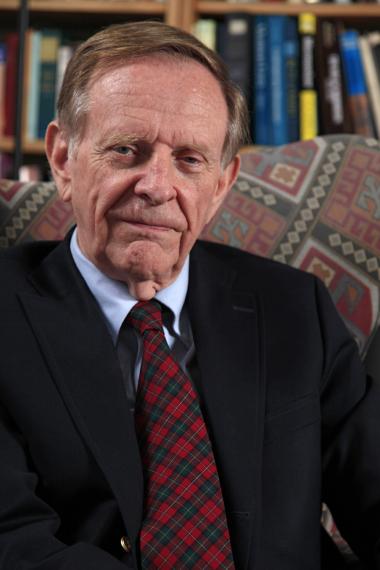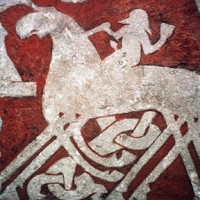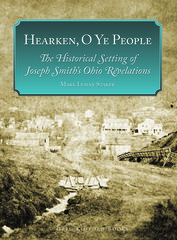-
•
•
17 responses

The University of Virginia today announced today a $3 million anonymous donation to establish the Richard Lyman Bushman Chair of Mormon Studies in the University’s Department of Religious Studies. The chair is still subject to approval by the University’s Board of Visitors, after which a search committee will look for candidates for the inaugural appointment, due to begin serving in the 2013-14 school year. Read More
-
•
•
92 responses
If you had any doubt about the impact of the announcement yesterday that missionary service for men and women can begin earlier, just read the reactions in the bloggernacle, on facebook and twitter and even in major newspapers. The largest of the blogs in the bloggernacle have already weighed in on the change… multiple times… in less than 24 hours. I have to wonder; has anyone not put in their two cents? Read More
-
•
•
8 responses
I had planned on giving a brief summary of Priesthood Session tonight; unfortunately, some family/logistical issues kept me from getting to our Church building until well after the session had started, so I’m afraid I missed the first speaker. And I’d planned on bringing my iPad to take notes on, but I accidentally left it at home, and was left with my phone for note-taking. But, in spite of the technical difficulties I faced, it was an enlightening and uplifting session of Conference. Below are my notes, with only the smallest edits for clarity and to fix some autocorrect problems… Read More
-
•
•
A few weeks ago a book by the Brazilian language entrepreneur and LDS Church member Carlos “Wizard” Martins, who started the massive Wizard Language Schools chain (similar to Berlitz), reached the bestseller lists in Brazil. I’m fairly sure that the book Desperte o milionário que há em você (Awake the Millionaire Inside of You) is the first by a Brazilian Mormon to reach the bestseller list. I first heard of his book just before it was launched in April, and I didn’t give it much thought then—I’m not really in the book’s the target audience of those seeking a financial… Read More
-
•
•
54 responses
As Sarah noted, Saturday and Sunday bring us our Fall semiannual General Conference. As part of our twice-yearly ritual, we’ll hear the Mormon Tabernacle Choir up to three times: one session of Conference Saturday, one session Sunday, and the Music and the Spoken Word broadcast before the first Sunday session. Read More
-
•
•
Gospel Doctrine lesson 40 for the Book of Mormon talks about a subject that isn’t explored as often in Mormonism today: The Gathering. In Joseph Smith’s day it not only mean the gathering, literal and spiritual, of the House of Israel, but it also meant the gathering of Mormon converts to the ‘center place’ of the Church. While we don’t call for the gathering of Mormons to a single place today, the concept is still important when we examine the role of the House of Israel and the times preceding the millennium. The scriptures, including the Book of Mormon in… Read More
-
•
•
10 responses
Feel like you’re treading water financially? I don’t suppose it will help to know that the wealth of the richest Mormons is also not growing? Perhaps not, but my analysis shows this to be the case. To be honest it’s hard to even think that they are put out! Read More
-
•
•
46 responses

At a multi-stake conference in Berlin in 2010, Area President Erich W. Kopischke quoted Joseph Smith as having declared that “England, Germany, Norway, Denmark, Switzerland, Holland and Belgium have a considerable amount of the blood of Israel among the people which must be gathered out.” Read More
-
•
•
4 responses
In the middle of his visit to the Nephites, Christ leaves the people for the night and then returns the following day (as recounted in 3 Nephi 17-19). Before he leaves, and then again after he returns the next day, Christ teaches the Nephites about prayer, and provides them with examples of prayers—one of which they were unable to even record. These prayers call to mind the model prayer that Jesus provided in the New Testament, the Lord’s Prayer, itself used as an oft-repeated prayer throughout Christendom and the inspiration for many pieces of poetry, including the following by W.… Read More
-
•
•
17 responses
Okay, I took a quick look through the Romneys’ 2011 tax return. There’s plenty that could be said (it is, after all, a 300+ page document), but I only want to highlight a couple things. Note that my explanations are based on reading his returns; to the extent I ascribe motive to the Romneys, it’s not because I know their hearts, but because that’s what the tax returns look like. Read More
-
•
•
65 responses
Is anybody else excited? Read More
-
•
•
Following the destruction that accompanied Christ’s crucifixion, the Nephites and Lamanites didn’t see relief, or light, until his resurrection and visit to the Americas. This story, found in 3 Nephi 11, is the culmination of the Book of Mormon narrative, the central meaning of the book. His arrival is also the central point of Parley P. Pratt’s poem Christ’s Ministry to the Nephites. Included in his book of poetry (arguably the first Mormon book of poetry aside from Emma Smith’s Hymnal), this poem is also among the first published poems to reference the Book of Mormon, as well as the… Read More
-
•
•
14 responses

Over the past year or so, I have become increasingly enamored of a popular Brazilian song, one that today makes me tear up simply from hearing the opening chords. On the surface, at least, the song, “Cálice” (Chalice), is quite religious. And its refrain is simple: Father, let this cup pass from me Father, let this cup pass from me Father, let this cup pass from me This cup of bloody red wine. And today, of all days, I think this song is particularly fitting. I will think of it during a moment of silence. Read More
-
•
•
80 responses
Despite being unfairly ambushed on the subject of religion prior to a recent performance on the Norwegian-Swedish television show Skavlan, Brandon Flowers admirably stood up for his faith, shying away from neither the battery of questions on his Mormonism by Norwegian journalist Fredrik Skavlan and others nor the full-on frontal assault on Joseph Smith, the Book of Mormon and God by surprise guest Richard Dawkins. While it was clear Flowers would have rather been talking about his music and his band, he nevertheless responded directly to questions about whether he actually believes the origin story of the Mormon faith and proactively cut into a Dawkins’ screed about the Book… Read More
-
•
•
One response
During the crucifixion of Christ as portrayed in 3rd Nephi, the devastation seems like it is beyond our understanding. Certainly the descriptions portray devastation on a level that no one today has experienced. The very earth reacts to the death of the Savior, and continues that reaction, apparently until his resurrection on the third day. May we never experience anything like that. But the portrayal raises an interesting theological issue, one that Parley P. Pratt picked up on in his earliest Mormon poetry. Read More
-
•
•
One response
With the beginning of what we Mormons can call the fifth gospel, the Book of Mormon begins the story of Christ’s birth, life, death and visit to the Americas, all from the perspective of the people’s there. And the initial story in 3rd Nephi is quite different from those in the New Testament. Here we see signs and wonders also, but they are more widely known and come under a threat of violence. The faith of the believers in 3rd Nephi was tried publicly and directly, while the faith of the few who knew anything about the import of the… Read More
-
•
•
16 responses
I want to note, upfront, that although this post was inspired by Rachel’s and Alison’s excellent recent posts, it is not meant in any way to respond to them. I fully agree with them that there are returned missionaries—even active, temple-attending returned missionaries—who do bad things. And those bad things can, physically, spiritually, and emotionally, hurt people around them, especially where the people around them (reasonably) believe that returned missionaries should not do bad things. Moreover, being male, my relationship with (male) returned missionaries did not have the same structural inequities Alison and Rachel describe, even when I was younger.… Read More
-
•
•
3 responses
Spiritual history is replete with types and shadows. The similarities that appear between events in widely-separated places and times lead to the conclusion that the Lord is trying to point out some truth to us, something we need to understand. I see a kind of repetition in this week’s Gospel Doctrine lesson, in which Samuel the Lamanite tries to call the Nephites to repentance (Helaman 13-16). Samuel preached just a few years before the birth of Christ, and he prophesied about the destruction in the Americas that would accompany Christ’s crucifixion soon afterward. But somehow his prophecies don’t sound very… Read More
-
•
•
8 responses
Coreen Johnson has graciously provided this personal story of Mormon Life, which I loved and thought would be a great addition here. Coreen is a stay-at-home mother of 4 who now lives in New Mexico. Enjoy! Elliot’s Vagrants by Coreen Johnson, FMHer “Hey lady! Do you have a dollar? Just a dollar! Please lady! Just a dollar! Please, ma’am!” Read More
-
•
•
6 responses
As a result of its political neutrality policy, the Church is not going to endorse Mitt Romney in his bid to become President (or, for that matter, Harry Reid in his bid to be reelected to the Senate). There are probably a number of reasons for the Church’s desire to avoid endorsing a candidate but, as I’ve said previously, one reason may well be the tax consequences of such an endorsement. (Short refresher: technically, the IRS could revoke the Church’s tax exemption, meaning the Church would owe taxes on all of its income other than donations, and that Church members… Read More
-
•
•
6 responses
Chapters 6 to 12 of Helaman highlight what Mormons have come to call the “pride cycle” — the cycle from righteousness and prosperity to pride and wickedness to suffering and to humility and repentance, leading back to righteousness and prosperity. Its a fascinating concept, one that I’m afraid we use too often to describe the world and others, and too little to refer to ourselves. I mean, when was the last time you asked yourself where you were in the “pride cycle?” Read More
-
•
•
11 responses
Once upon a time, the rare article or essay on Mormonism was noteworthy and bloggable. Now, in this extended Mormon Moment, there are so many it is hard to even keep track of them. But Adam Gopnik’s article “I, Nephi: Mormonism and its meanings” deserves special notice, not just because The New Yorker is widely read and respected but because it is a serious and informed discussion. Maybe the media is getting better when it comes to discussing Mormonism. Read More
-
•
•
9 responses

[The third part of a translation of an article written by Emanuel Santana and published on the Brazilian group blog, Vozes Mórmons. The article raises many questions about politics and the Church—questions we are familiary with in the U.S. and perhaps Canada, but which are new territory for Mormons in Brazil and elsewhere around the world. Part one of this series was published Tuesday.] . Moroni Torgan and the Church in Fortaleza by Emmanuel Santana The 2004 race for mayor was more exciting. The “Juraci Era” had put Fortaleza’s voters in the mood for change. Inácio Arruda and Moroni Torgan… Read More
-
•
•

[The second part of a translation of an article written by Emanuel Santana and published on the Brazilian group blog, Vozes Mórmons. The article raises many questions about politics and the Church—questions we are familiary with in the U.S. and perhaps Canada, but which are new territory for Mormons in Brazil and elsewhere around the world. Part one of this series was published yesterday.] . Moroni Torgan and the Church in Fortaleza by Emmanuel Santana Out of the books and stories of their elders. I can not remember anything of Moroni’s first election, since occurred just a few years after… Read More
-
•
•
3 responses

Finally, a book by Steve Peck that I can read with my children! At first my husband thought that would be A Short Stay in Hell; it is only 70 pages, but I had to disabuse him of that notion. As much as children enjoy thinking about infinity (How can anything go on forever? But if there is a limit, what is on the other side?), I thought the main character was brutally murdered far too many times to be appropriate bedtime reading material for small children. And I would like to save that little volume for them to read… Read More
-
•
•
6 responses

The following is a translation from an article written by Emanuel Santana and published on the Brazilian group blog, Vozes Mórmons. I have divided it into three parts because the post is so long and raises so many questions about politics and the Church—things that strike me as repeatedly-covered issues in the U.S. and perhaps Canada, but which are new territory in Brazil and elsewhere around the world. This first part covers background information, from the introduction of the Church in Fortaleza to Moroni Torgan’s arrival and rise to prominence as Brazil’s first Mormon Congressman. Read More
-
•
•
3 responses
The corruption and internal strife in the initial chapters of Helaman are marked by the rise of secret combinations among the Nephites and Gadianton’s rule over the band eventually known as Gadianton’s Robbers. While I think our society today is far from the level of corruption seen then, we certainly deal with similar corruption to a smaller degree. And societies we do know today (perhaps Somalia and Zimbabwe and probably others also) seem as corrupt or worse than what the Nephite’s had to deal with. It is hard to imagine how anyone survives such regimes without also becoming corrupt. Read More
-
•
•
8 responses

I received my review copy of Hearken, O Ye People at work; I opened it and began to read on the El heading home. And, from page 1 (or, actually, page xvii), my jaw dropped. Staker started his book with an almost-15-page chronology of Kirtland, beginning in May 1796 as a group begins to survey townships in the Western Reserve and ending on July 6, 1838, when Kirtland Camp leaves Kirtland to settle in Missouri. For that chronology alone, Hearken, O Ye People is worth its price, at least for those form whom the Kirtland years are overshadowed by the… Read More
-
•
•
21 responses
Today is the 15th anniversary of the end of my mission. (Note that I can’t entirely remember what I mean by that—I’m pretty sure that August 5, 1997, was my last day of proselytizing, the 6th I got on an airplane, and the 7th I arrived home. But it has been 15 years, and I’m not 100% sure.) And what does that two years mean to me, 15 years later? On one level, not a whole lot. I don’t think about it a whole lot; my days are much more likely spent occupied by the Internal Revenue Code. Or my… Read More
